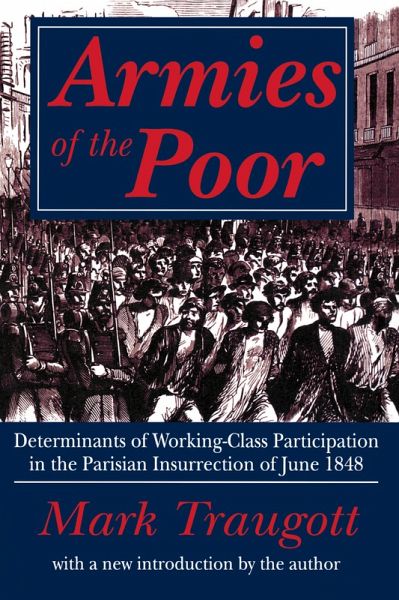
Armies of the Poor (eBook, ePUB)
Determinants of Working-class Participation in in the Parisian Insurrection of June 1848
Versandkostenfrei!
Sofort per Download lieferbar
46,95 €
inkl. MwSt.
Weitere Ausgaben:

PAYBACK Punkte
23 °P sammeln!
In June 1848, two irregular armies of the urban poor fought a four-day battle in the streets of Paris that decided the fate of the French Second Republic. The Parisian National Workshops and the Parisian Mobile Guard-organizations newly created at the time of the February Revolution-provided the bulk of the June combatants associated with the insurrection and repression, respectively. According to Marx's simple and compelling hypothesis, a nascent French proletariat unsuccessfully attempted to assert its political and social rights against a coalition of the bourgeoisie and lumpenproletariat, ...
In June 1848, two irregular armies of the urban poor fought a four-day battle in the streets of Paris that decided the fate of the French Second Republic. The Parisian National Workshops and the Parisian Mobile Guard-organizations newly created at the time of the February Revolution-provided the bulk of the June combatants associated with the insurrection and repression, respectively. According to Marx's simple and compelling hypothesis, a nascent French proletariat unsuccessfully attempted to assert its political and social rights against a coalition of the bourgeoisie and lumpenproletariat, represented by the Parisian Mobile Guard. Through a detailed study of archival sources, Mark Traugott challenges this interpretation of these events and proposes an organizational explanation.Research has consistently shown that skilled artisans and not unskilled proletarians stood at the forefront of the revolutionary struggles of the nineteenth century. Traugott compares the social identities of the main participants on opposite sides of the conflict and sorts out the reasons for the political alignments observed. Drawing on work by Charles Tilly and Lynn Lees, Traugott demonstrates that the insurgents were not highly proletarianized workers, but rather members of the highly skilled trades predominant in the Parisian economy. Meanwhile, those who spearheaded the repression were little different in occupational status, though they tended to be significantly younger. Traugott's ""organizational hypothesis"" makes sense of the observed configuration of forces. He accounts for the age differential as a by-product of the recruitment criteria that Mobile Guard volunteers were required to meet. Finally, he explains why class position creates no more than a diffuse political predisposition that remains subject to the influence of situation-specific factors such as organizational affiliations. Armies of the Poor helps clarify our understanding of the dynamic at work in the insurrectiona
Dieser Download kann aus rechtlichen Gründen nur mit Rechnungsadresse in A, B, BG, CY, CZ, D, DK, EW, E, FIN, F, GR, HR, H, IRL, I, LT, L, LR, M, NL, PL, P, R, S, SLO, SK ausgeliefert werden.













